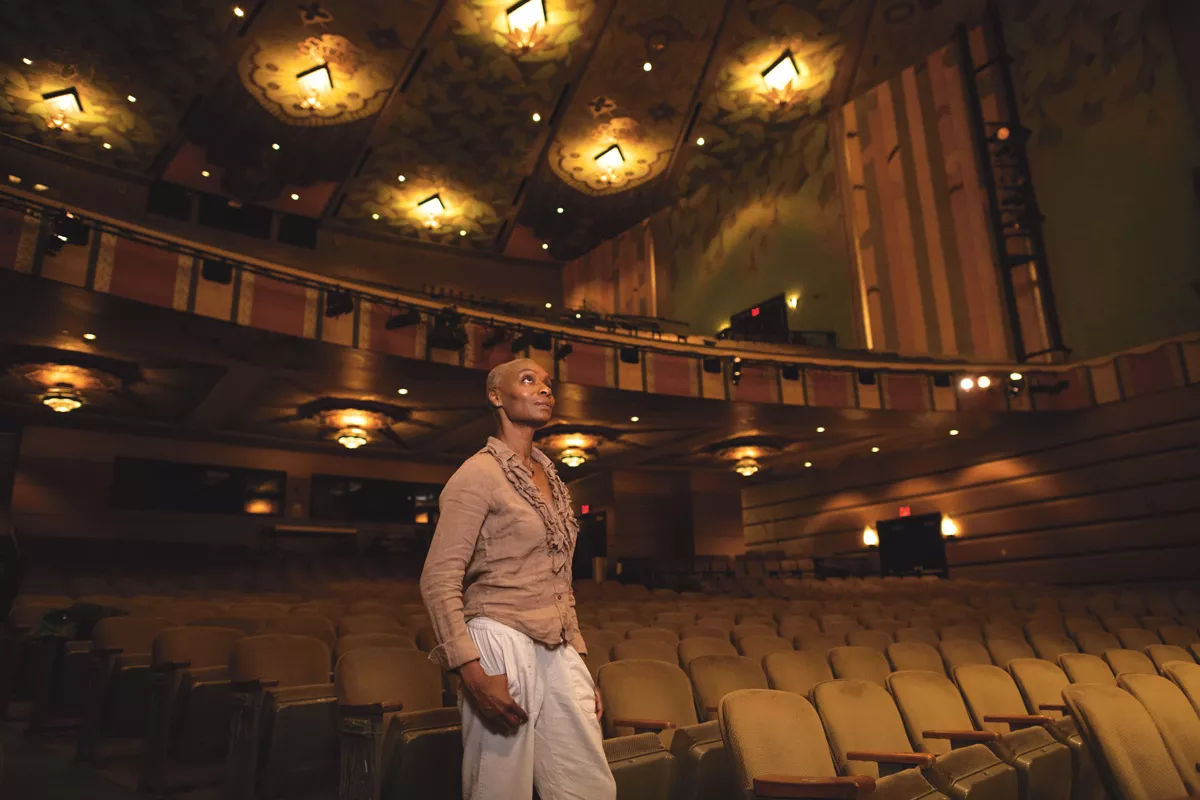
Casting director Nike Imoru was born to Nigerian parents, speaks with an English accent and lives in Spokane.
She's always straddled multiple identities, multiple roles, multiple possibilities. It was exactly the kind of self-conception that primed her to fall in love with the world-hopping magic of theater as a 14-year-old. Credit Macbeth.
"Shakespeare happened for me. I wasn't expecting it," Imoru says. "It was an encounter. It was fiery and lifelong."
Some connect with Shakespeare because they see parallels to their own lives. But for Imoru the appeal was the opposite. Shakespeare was nothing like her life as a teenager in working-class East London.
"These characters had big emotions. And the landscapes were massive, emotionally and environmentally. Nothing happened in a room. It was on a 'blasted heath...'" Imoru says. "I wanted to wear a sword and a cape and say, 'my honored Lord.' It sounded so much more interesting than, 'Yes, Ms. Diamond.'"
In other words, identity isn't frozen or static. It's something that can be constantly reinvented.
She's lived in Italy. All over Europe. In Africa. She's spoken five different languages. Even that London community she grew up in crackled with the possibility embedded in being surrounded by people of different backgrounds.
"How I was born, where I was born — just the nature of my reality is shifting between cultures. Often," Imoru says. "Where I live is in a place of multiverses that are infinitely diverse."
And that, of course, is theater itself: It's transporting yourself to a new reality in the multiverse, into a new culture, a new world, a new mind. And then it's infusing that audience with that reality.
For Imoru, that's sometimes meant acting on the stage in Greece, giving a one-woman show in Delphi, the birthplace of Western theater.
"I remember thinking, 'Oh, my god, the Olympian gods are here. Wow!' And I communed with them. And then I got to give this one performance.'"
That's sometimes meant acting for film, such as when she played Samuel L. Jackson's therapist in 2006's Home of the Brave, a movie released shortly after Imoru's two-year stint as the director of Interplayers.
But other times it's meant the art of selecting other artists, as a casting agent. Casting, say, DJ Qualls — the scrawny guy from Road Trip — as "Citizen Z" in Z Nation? That was Imoru's doing at least, in part.
But Imoru, she went beyond simply selecting someone for a role. She melded casting actors with coaching actors.
"I decided that every actor that auditioned for me would leave with something," Imoru says. "Anyone that came in to audition would leave with a gift about themselves."
She'd zero in on something they could improve. Sometimes it was as basic as their posture or the way they breathed. Sometimes it got at something deeper.
"The anxiety that they're bringing in," Imoru says. "How they're armored. What weapons they're carrying. How they're self-sabotaging, self-critiquing."
She put them under an exacting critical microscope: And they loved it. It was like a mini-workshop, she says. They were getting feedback by an actual casting director, not just performing into a void. Some people came to audition just to get feedback from her.
The advice can be different, of course, depending on the medium.
"I describe theater as a polygamous experience," Imoru says. "I describe acting for the camera as monogamous."
Camera work is deeply intimate — it's more like you're putting on a personal performance for an audience of one. But in theater, you need to act big enough for the nosebleed seats and subtly enough to impress those in the front row.
You need to perform on all levels — with your voice, with your face, with your body, at all times.
The identity of the face or the body doesn't always have to match society's expectation, to be clear. Sometimes, it's better if it doesn't. Imoru herself has played Hamlet — the Danish prince.
"I certainly didn't play Hamlet as a 'Nigerian woman,'" she says. "I didn't play Hamlet as an English woman, or a Black woman. I just embodied the essence, the struggle, the journey, the arc. The rest of me came along with that, right?"
As a Black woman, she says, she believes anyone can play any role.
"Why can't this person be Black or Asian-American?" Imoru asks. "Why can't this person in a wheelchair be in a zombie apocalypse?"
Take the moment when Z Nation wanted to cast an Elvis impersonator for a One Flew Over the Cuckoo's Nest homage set in an asylum. And one of the actors who caught her eye at the audition, she says, was Brandon Marino, who moved very "powerfully." But Marino, unlike Elivs Presley, was Black.
And so, along with a slate of White Elvises, she presented Z Nation showrunner Karl Schaefer with Marino.
"I thought, 'This is such a risk,'" Imoru says. "Why would he choose a Black Elvis — a brilliant Black Elvis?"
But Schaefer went with it, Imoru says. He took the risk.
She recalls speaking with students in Britain about who they thought could play which roles.
"They didn't feel that a Black person, for example, could be the queen of England or aristocrats, but they thought it was OK that a White person played Gandhi," Imoru says.
In some ways, that's been reversed today. The Netflix series Bridgerton actually does have a Black queen of England and several Black aristocrats. The original Broadway run of Hamilton had a Black Thomas Jefferson. But at the same time, these days, there's been a ton of criticism leveled at, say, Scarlett Johansson playing an Asian character. Directors, actors and critics have been debating about whether straight actors can play gay characters or cisgender actors can play trans characters.
They certainly can, Imoru says. But the question is whether they should. Here's where identity does matter, she says. An actor who really has experienced the "very-alive-trauma" or racism and discrimination tied to their identity can sometimes access that and create a deeper and far more profound performance.
"We're in a time where the authentic — the authentic experience of the 'other' — is what is needed in order for that community to be seen, heard, healed, represented," Imoru says. "I think it's needed at this time."




















